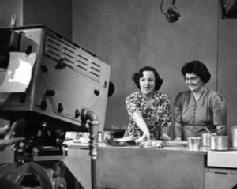A History of Television for Women in Britain: 1947-1989
AHRC Research Project, 3 years 2010-2013. AHRC Award: £295,844
Main project website at De Montfort University
Television for Women Conference, May 2013
Pop-up exhibition and drop-in centre - 'The Pop Up TV Pop Shop' and Helen Wheatley's blog about the shop
Dr Rachel Moseley and Dr Helen Wheatley have been awarded the University's Arts Impact Award in recognition of the time, hard work and consideration put into engaging the public with the benefits of their research
Project investigators: Dr Rachel Moseley (University of Warwick), Dr Helen Wheatley (University of Warwick), Dr Helen Wood (De Montfort University, Leicester); Postdoctoral Research Fellow: Dr. Mary Irwin (University of Warwick; Doctoral Researcher: Ms. Hazel Collie (De Montfort University)
The project team is researching television programming made for and watched by women viewers during a significant period of British Television history: 1947-1989. In this period television restarted after the war. Commercial television was introduced, followed by the introduction of BBC2 and Channel 4. Despite the suggestive connection between the development of television as domestic technology and changes in gender relations, there has been scant attention paid to this relationship over time. The development of television and its viewers in Britain will therefore be related to social change, particularly in the growth of consumer culture, increase in the female workforce, the re-organisation of family life, and the rise of the women's and civil rights movements during the research period. Available glimpses of programming from the period suggest interesting shifts in content, modes of address and representations of gender. However, little is known about how the British television industry, with its public service ethos, conceptualised the female audience, or how, when and why programmes were made specifically for women. Also, little is known about women's memories of television viewing, despite prevailing common-sense and academic assumptions about the feminisation of the medium.
This project works to fill in some of the gaps in the history of British television, outlining significant moments in the period, specific programme types, genres and scheduling slots which have become significantly marked as feminine. To these ends it pursues an approach to production, text and reception through an innovative combination of methods: It will explore the production culture, policies and decision making which produced the strong vein of television programming for women in Britain, using, among other sources, the BBC Written Archive at Caversham and the ITC collection held at the BFI. It will document, using listings magazines and popular publications for women, the factual and dramatic programming that was addressed specifically to a female viewer to establish (and attempt to protect) what is available in the archives. It will produce an analysis of some of the key texts that emerge from this search, by viewing where possible, or by reconstructing programmes through written archives (floor plans, shooting scripts etc.). Our analysis will explore the terms in which the female viewer has been addressed, how that address has changed over time, identifying the continuities and transformations (in both form and content) with the current period.
It will attempt to recover a generationally and nationally dispersed set of female audience members from the historical period in question who will be approached through contemporary women's publications. Our interviews will explore their memories of television against their personal narratives to uncover the programmes that they saw as being for them, and question how these programmes resonated with their everyday lives. The data will be analysed against the backdrop of discourses from the industry.
A key impact of this project will be to bring the issue of preservation of programming often marked as 'for women', or feminised as part of the 'everyday' and thus characterised as ephemera, into clearer focus for those organisations involved in archiving 'our' television history. Alongside academic publications on the subject, the project will produce reports for both archivists and women in media groups which will outline the significance of a feminist politics of archiving through our key findings about influential programmes and their significance in women's cultural memories. This is a project with a strong feminist agenda, which aims to contribute to a fuller understanding of the production, texts and reception of women's media culture in Britain.
To contact the team please email Rachel.Moseley@warwick.ac.uk (Principal Investigator)

